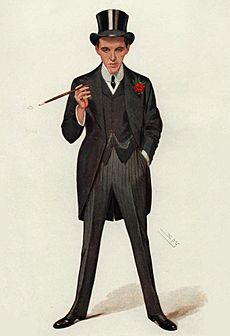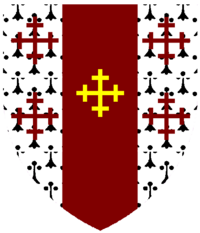F. E. Smith, 1st Earl of Birkenhead facts for kids
Quick facts for kids
The Earl of Birkenhead
|
|
|---|---|
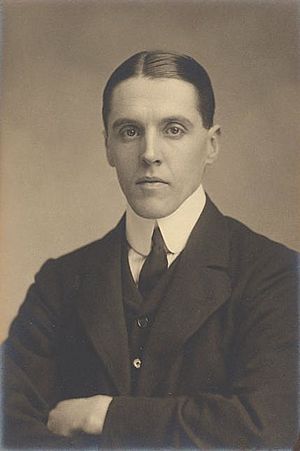 |
|
| Secretary of State for India | |
| In office 6 November 1924 – 18 October 1928 |
|
| Prime Minister | Stanley Baldwin |
| Preceded by | The Lord Olivier |
| Succeeded by | The Viscount Peel |
| Lord High Chancellor of Great Britain | |
| In office 10 January 1919 – 19 October 1922 |
|
| Prime Minister | David Lloyd George |
| Preceded by | The Lord Finlay |
| Succeeded by | The Viscount Cave |
| Attorney-General for England | |
| In office 3 November 1915 – 10 January 1919 |
|
| Prime Minister | H. H. Asquith |
| Preceded by | Sir Edward Carson |
| Succeeded by | Sir Gordon Hewart |
| Solicitor-General for England | |
| In office 2 June 1915 – 8 November 1915 |
|
| Prime Minister | H. H. Asquith |
| Preceded by | Sir Stanley Buckmaster |
| Succeeded by | Sir George Cave |
| Member of the House of Lords Lord Temporal |
|
| In office 3 February 1919 – 30 September 1930 Hereditary Peerage |
|
| Preceded by | Peerage created |
| Succeeded by | The 2nd Earl of Birkenhead |
| Member of Parliament for Liverpool Walton |
|
| In office 8 February 1906 – 14 December 1918 |
|
| Preceded by | James Henry Stock |
| Succeeded by | Harry Chilcott |
| Personal details | |
| Born |
Frederick Edwin Smith
12 July 1872 Birkenhead, Cheshire, England |
| Died | 30 September 1930 (aged 58) Belgravia, London, England |
| Political party | Conservative |
| Spouse |
Margaret Eleanor Furneaux
(m. 1901) |
| Children |
|
| Education | |
Frederick Edwin Smith, 1st Earl of Birkenhead, GCSI, PC, DL (born July 12, 1872 – died September 30, 1930) was a British politician and lawyer. He was a member of the Conservative Party. He held important government jobs in the early 1900s. One of his most important roles was Lord High Chancellor of Great Britain.
He was known for being a great speaker. He was also known for his strong opinions and his quick wit. He was a close friend and political ally of Winston Churchill. He passed away at 58 years old.
Contents
Early Life and Education
Frederick Edwin Smith was born in Birkenhead, Cheshire, England. He was the oldest son and second of five children. His father, also named Frederick Smith, was an estate agent and later a lawyer. He was also a local politician. Sadly, his father passed away at 43, shortly after being elected mayor of Birkenhead.
Smith went to school in Birkenhead and then in Southport. When he was just ten years old, he announced his dream to become the Lord Chancellor. He later attended Birkenhead School.
Studying at Oxford University
Smith earned a scholarship to University College, Liverpool. After that, he won another scholarship to Wadham College, Oxford, in 1891. At Oxford, he became well-known for his energy and sharp wit. He was a leading figure among his friends, including the athlete C. B. Fry and future politician John Simon. They were very active in both sports and the Oxford Union Society, which is a famous debating society.
Smith was involved in politics even while at Oxford. He spoke for the Conservative Party in the 1892 election. He argued against the Liberal Party's plan for Irish home rule, which meant giving Ireland more control over its own government.
He studied Law and became President of the Oxford Union in 1894. He graduated with a top degree in law in 1895. In 1896, he won a special law scholarship called the Vinerian Scholarship. He also became a fellow at Merton College. Today, there are special awards at Merton College named after him.
In 1897, Smith was arrested during a student protest at the opening of the new Oxford Town Hall. He was trying to help a college worker who was being handled roughly by the police. Smith was the first person held in the new police station. He defended himself in court and was found not guilty.
Becoming a Barrister
After finishing his studies, Smith became a barrister (a type of lawyer who argues cases in court) in 1899. He quickly built a very successful law practice in Liverpool.
His Powerful Legal Style
Smith became known as a very strong advocate (someone who argues for a client in court). He first gained fame in Liverpool, and then in London after he became a Member of Parliament in 1906.
In 1907, he was asked for his legal opinion on a major case. A company called Lever Brothers wanted to sue newspapers owned by Lord Northcliffe. The newspapers had claimed there was a "soap trust" to raise soap prices. Smith worked all night to read the case papers. He then gave a very short but powerful opinion: "There is no answer to this action in libel, and the damages must be enormous." The newspapers ended up paying Lever £50,000, which was a huge amount at the time.
In 1908, Smith was made a King's Counsel. This is a special title for experienced barristers. He became one of the most famous and highest-paid lawyers in the country. He earned over £10,000 per year before World War I. He used some of his earnings to buy a country house in Charlton in 1907.
A Member of Parliament
Smith wanted to join Parliament. He became a candidate for the Walton division in 1903. In the 1906 election, he won the seat. He kept this seat until 1918.
He made a memorable first speech in Parliament, titled "I Warn the Government..." After this speech, Tim Healy, a famous Irish politician, sent Smith a note. He wrote, "I am old, and you are young, but you have beaten me at my own game." Smith argued that new laws should not allow intimidating protests.
Smith did not want to limit the powers of the House of Lords. He worried that a parliament without checks and balances could become too powerful.
He became a key leader in the Unionist part of the Conservative Party. This group strongly opposed Irish Home Rule, which would have given Ireland more self-governance. He was often seen with Edward Carson, another Unionist leader. Because of this, he was sometimes called "Galloper Smith."
Smith also strongly opposed the disestablishment of the Welsh part of the Church of England. This would have separated the church from the state in Wales. He called the bill "a bill which has shocked the conscience of every Christian community in Europe."
During the First World War
Smith joined the Territorial Army in 1913. He was a captain when World War I began. At first, he was in charge of the Government's Press Bureau, which controlled newspaper censorship. This role was not very successful.
In 1914–1915, he served in France as a staff officer with the Indian Corps. He later helped write an official history called The Indian Corps in France.
In May 1915, H. H. Asquith appointed him Solicitor General. He was also knighted, meaning he received the title "Sir." In October 1915, he became Attorney General. This job allowed him to attend Cabinet meetings.
As Attorney General, he led important legal cases for the government. One famous case was the trial of the Irish nationalist Sir Roger Casement in 1916. Casement was accused of treason for trying to get German help for Irish independence. Smith's work on this case added to his reputation as a brilliant lawyer.
In 1918, Smith was made a baronet. After his old parliamentary seat was changed, he was elected for the West Derby Division in December 1918. However, he was soon moved to the House of Lords.
After the War: Lord Chancellor
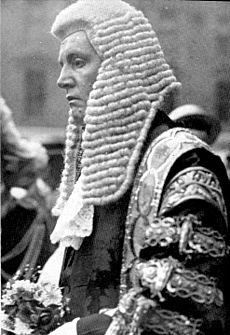
In 1919, he was given the title Baron Birkenhead. This happened after Lloyd George appointed him Lord Chancellor. At 47, he was one of the youngest Lord Chancellors in centuries. He proved to be a very good Lord Chancellor.
He helped pass several important legal reforms. This included the Law of Property Act 1922, which began to change English land law. He also tried to reform divorce laws, believing they caused much unhappiness.
Despite his past opposition to Irish Home Rule, Smith played a key role in the talks that led to the Anglo-Irish Treaty in 1921. This treaty created the Irish Free State the next year. Smith helped draft much of the treaty. His support for this and his good relationships with Irish leaders like Arthur Griffith and Michael Collins surprised some of his former allies.
Smith received more titles in 1921 and 1922. He became Viscount Birkenhead and then Earl of Birkenhead. By 1922, Birkenhead and Churchill were leading figures in Lloyd George's government.
Out of Office: 1922–1924
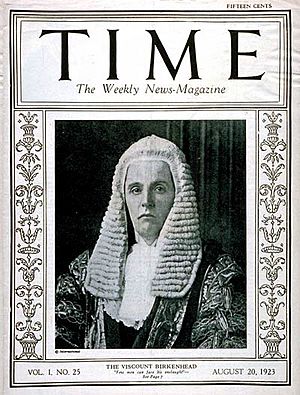
After the Lloyd George government ended in 1922, Birkenhead did not hold a government job for a few years. He was very open about his dislike for the new governments led by Bonar Law and Stanley Baldwin. He made many sharp comments about the new ministers.
In December 1922, a controversy arose when Birkenhead claimed he didn't know about a letter from the Greek leader Dimitrios Gounaris asking for British help against Turkey. It turned out that Birkenhead had seen and approved the letter. He had to apologize in the House of Lords.
In May 1923, Stanley Baldwin became Prime Minister. He famously said that his new Cabinet was "a Cabinet of faithful husbands," which was a jab at Birkenhead.
Birkenhead gave a famous speech at the University of Glasgow in 1923. He told students that the world still offered "glittering prizes" to those with "stout hearts and sharp swords." However, his aggressive style was different from the new, calmer politics of the time. He believed that nations' power would always depend on their military strength.
Family Life
Smith married Margaret Eleanor Furneaux in April 1901. They had three children:
- Lady Eleanor Furneaux Smith (born 1902, died 1945)
- Frederick Winston Furneaux Smith, 2nd Earl of Birkenhead (born 1907, died 1975)
- Lady Pamela Margaret Elizabeth Smith (born 1914, died 1982)
Secretary of State for India: 1924–1928
In 1924, Stanley Baldwin formed a new government and appointed Birkenhead as Secretary of State for India. This was a very important role. Birkenhead was not very optimistic about India's independence movement. He thought the differences between Hindu and Muslim groups in India were too big to overcome. He tried to limit the involvement of native Indians in local governments.
In October 1927, in his role as Secretary of State, he unveiled the Neuve-Chapelle Indian Memorial. This memorial honors Indian Army soldiers who died in World War I and have no known grave.
Birkenhead also helped the government negotiate with the Trades Union Congress to try and prevent the 1926 General Strike. He strongly supported a law in 1927 that changed how trade unions could collect money for political purposes.
In October 1928, Birkenhead left the government to work in business.
Later Life and Legacy
After leaving politics, Birkenhead became the Rector of the University of Aberdeen. He also joined the boards of major companies like Tate & Lyle and Imperial Chemical Industries. He was also the High Steward of the University of Oxford.
Birkenhead wrote several articles about "The peril to India." He believed that without British rule, India would fall into chaos. He also wrote a book in 1930 called The World in 2030, which imagined what the future might be like.
His friend Winston Churchill described him as having "all the canine virtues in a remarkable degree – courage, fidelity, vigilance, love of chase." Churchill also said, "If he was with you on Monday, he would be the same on Tuesday. And on Thursday, when things looked blue, he would still be marching forward with strong reinforcements."
Birkenhead passed away in London in 1930 at the age of 58. His ashes were buried in the churchyard at Charlton, Northamptonshire.
Portrayals in Film
Lord Birkenhead is shown in the film Chariots of Fire. In the movie, he is an official of the British Olympic Committee. He is played by actor Nigel Davenport.
Works
|
|
Notable Legal Cases
As a Lawyer
- R v Casement [1917] 1 KB 98, where he prosecuted Sir Roger Casement for high treason.
As a Judge
- Viscountess Rhondda's Claim [1922] 2 AC 339, a case about the right of peeresses (female nobles) to sit in the House of Lords.
- R v Secretary of State for Home Affairs, ex p O'Brien [1923] AC 691, a case about the legality of British policy of holding people without trial in Ireland.
Images for kids
Coat of Arms
|
 | Audre Lorde |
 | John Berry Meachum |
 | Ferdinand Lee Barnett |


